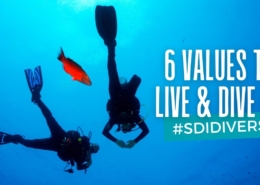The Art of Slowing Down
By Rick Allen
One of the reasons you most likely started scuba diving is because of the quietness found under water. It’s peaceful down there without phones, computers, or any of the other daily distractions of our terrestrial lives. It’s just you and Cousteau’s “silent world.” This is accompanied by yoga-like rhythmic breathing and the sound of escaping exhaust bubbles as they rise to the surface.
Why is it then that I commonly see so many divers kicking away quickly while overlooking the best features of the dive site? Why don’t they slow down and take more of it in? Here are some ways to see more while covering less ground on your next dive.
Avoid sudden movements that scare sea life away
Have you ever noticed how often fish seem to be swimming away from you and not toward you? Many species have electromagnetic sensory organs that alert them when a large predator is approaching.
See if you can maintain slow and steady movements the next time you’re in the water. Easily frightened species will still notice you, however, your easy-going pace is less likely to trigger their fight-or-flight response.
The same applies to sessile, or non-mobile, invertebrates as well. By that, I mean all of those cool, flower or feather-like anemones that come out of small tubes in the reef. They’re less likely to retreat into hiding if they don’t observe you as a threat.
Try looking for creatures that camouflage themselves.
An octopus is a great worldwide example of this. Unless you find an octopus swimming out in the open, they can be incredibly difficult to see if you’re not looking close enough. Other cryptic sea life can include wobbegong sharks, scorpion fish, halibut and one of my personal favorites, kelp greenlings.
You can also try looking for species that are very small like nudibranchs or seahorses. Nudibranchs can be easier to spot because many of them are brightly colored. Seahorses, on the other hand, can be both small and well camouflaged. You’re sure to impress other divers and make some quick friends if you can point a seahorse out to them on your next dive!
Get the most out of your air.
On land, you don’t breathe nearly as hard when you’re watching TV as you do when you’re out for a jog. This means the rate of your surface air consumption, often referred to as your SAC rate, is lower when you’re not performing cardio.
The same applies under water. The more you move, the heavier you’re going to breathe. The heavier you breathe, the faster your air will drain. By keeping movements small, slowing down and taking in the full scene in front of you, you’ll notice that your usual tank of air will start to last longer. This will give you more time to enjoy finding sea life that other divers overlook.
Become a more capable diver.
In addition to noticing more species and staying down longer, there are two other major benefits of putting these points in practice. These are:
- Better buoyancy control
- Better propulsion techniques
Once you become accustomed to staying relatively still, changes in your buoyancy will become more apparent. Previously, you may have compensated for reduced or increased buoyancy by kicking harder in the direction you wanted to go. But once you’re moving less, you’ll start to focus more on making small adjustments to maintain neutral buoyancy. Before you know it, you’ll be looking just as cool and in-control as your instructor did during your Open Water course.
Also, with better buoyancy comes better propulsion techniques. Ever notice how seasoned divers can seemingly turn on a dime or even propel themselves backward? After you’ve mastered neutral buoyancy, you can begin practicing different fin movements like the frog kick, reverse kick or helicopter turn.
Building upon your dive skills in this way will make you a more capable diver as well as a more observant one. Have any future interest in taking a TDI tech diving course? The skills you can put into practice here are foundational to some of the advanced techniques you’ll need to know in order to be a competent tech diver.
To finish this all off, you’ll even find that you have more energy at the end of the day. While other divers are falling asleep early from exhaustion, you’re basking in the glow of a radiant sunset and thinking about all of the wonderful things you had never taken the time to notice before.
You may even get a few compliments from the dive staff and an offer to join them for a drink back at the shop. Late night conversation turns into a series of dive stories about exotic locations, close encounters and the benefits of slowing down to enjoy the good things in life. Congratulations. You’re one of the tribe now.















Lascia un Commento
Vuoi partecipare alla discussione?Sentitevi liberi di contribuire!